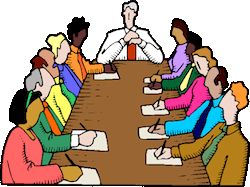- February 11, 2013
- Posted by: andreag
- Category: CommunicationGoverning BoardOrg CultureSystems-Process-Improvement

Effective Meetings Make a Difference
Working recently with a management group to help build them as a team reminded me of how vital effective meetings are to teamwork. The impact of meetings is never neutral, they are either building relationships and morale or eroding them.
What do I mean? Meetings erode relationships when members don’t listen, don’t respect the opinions of others, don’t take responsibility for their own actions, don’t offer to help a member in need, resist other members commenting on their area of the organization, speak in generalities or come to the table with apathy about their work. There are other reasons to be sure, but these are major issues.
Conversely, meetings build cooperation and morale when the opposite of all the factors mentioned above exist. What also helps build morale and cooperation is a sense of humor, willingness to share what is going on personally in your life that impacts how you “show up” to the team, and most importantly, whether team members honor their agreements.
“Honor agreements? What agreements?”, you might ask. All of them, even the small ones. Be on time. Start the meeting on time. Follow the rules you establish for the conduct of meetings (you should have these). Complete your tasks on time. Keeping agreements builds trust, and trust builds teams. It’s that simple.
Beyond these relationship impacts on the effectiveness of meetings, there is an equally important set of basic meeting mechanics that can unravel a meeting swiftly when ignored. I actually have marveled at how few groups use the mechanics of good meeting management, and how few members of groups complain about it. They just continue to leave meeting after meeting feeling as if they wasted their time. Here is a short list of what I believe are the most important mechanics to assuring a successful meeting.
Key meeting mechanics:
- Allow time for team members to simply share what’s on their minds, be it about the organization or about them personally. I call this team hygiene. Everyone knows when someone is off kilter, and unless they know why, they waste a good deal of time wondering about it. Our favorite tool for this, and one of the essential keys for building a solid team is What I Feel Like Saying. You can learn more about it here.
- Make the meeting a priority. No absences allowed unless approved by the team leader. Underlying this point is making sure as the leader that the meeting is valuable. If you are insisting others be on time and fully participate, then assure you have a clear, tight agenda and set of goals for the meeting. Then stick to your schedule and agenda.
- Following closely on that last point is to share only what is vital for others on the team to know about. Don’t get lost in the weeds. What does the full team need to know vs. what is overkill or redundant? Keep your agenda and discussion clear, concise and on point. (A sample agenda for a board meeting can be found here as an example.)
- Again, following on the last point’s heels, run the meeting briskly. If you get bogged down on a point that clearly has no resolution in the time allotted, assign team members clear responsibility to handle the issue outside the meeting and be prepared to report back at the next meeting. For simple meeting mechanics that can help, use Robert’s Rules of Order.
- If this is an on-going team meeting, like a regular strategic planning review meeting, for example, make sure you are meeting frequently enough to check progress and problem-solve if necessary. No one needs too many meetings, but too few can be just as damaging in that projects that are derailing or team members that are floundering can get too far off track when there is too much time between meetings. For example, I recommend every two weeks for a strategic plan update meeting.
- Review key metrics regularly. If you don’t have data to review that shows the effectiveness of the team’s work and progress, it is hard to have effective meetings. You are managing by anecdote vs. data, which is dangerous. Give us a call to help determine effective metrics for your team.
- Capture all “To Do’s” that come up in the meeting and assure there is a team member assigned responsibility and a due date. Also review status of outstanding To Do’s at each meeting. Challenge team members who don’t meet their commitments or help them problem solve if appropriate.
- End the meeting with each person commenting on what went well in the meeting and how the meeting could have gone better. Make a note of suggestions for improvement and make sure to implement them whenever possible. If team members are honest and you are diligent about implementing their suggestions, you will get to a point where members have much that is positive to say and few needs for improvement. And that means you have stabilized as a high performing team.
That is a quick list of easy to implement meeting mechanics. Over the next few months, we will be adding some blog posts on more specific tools and processes to help you facilitating in teams. In the meantime, did I miss any key points for meetings that you wouldn’t be without? Drop me an e-mail. We would not only enjoy reading them, we will be sure to pass them on to others in this series of meeting facilitation posts.



